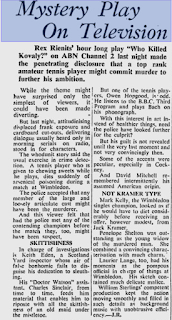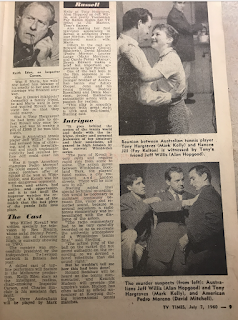A sports-related murder mystery from Rex Rienits.
Plot
Hungarian tennis player Ivor Kovali is playing in a semi-final at Wimbledon against Australian player Tony Hargreaves. Kovali, who is winning the game, is chewing sweets then dies suddenly of arsenic poisoning.
A Scotland Yard inspector, Carson, looks into the murder with the help of his assistant, Sgt Scott. Suspects include his widow Maria, who hated Kovali's cruelty; Maria's lover Dimitri; Tony Hargreaves, who stood to win a thousand pounds if he won the game; Australian player Jeff Willis who Kovali accused of cheating; American played Pedro Moreno who ws going to face Kovali in the final.
When Carson views footage of the game he figures out whodunnit
Cast
- Keith Eden as Inspector Carson
- Charles Sinclair as Sgt Scott
- Mark Kelly as Tony Hargreaves
- Alan Hopgood as Jeff Willis
- Fay Kelton as Jill Masters, Tony Hargreaves' fiancee
- Penelope Shelton as Maria Kovali
- Edward Brayshaw as Dimitri Rikhjovic
- David Mitchell as Pedro Moreno
- Carole Potter as Nancy
- Laurie Lange as official in charge of Wimbeldon
- Bryan Edwards as Igor Kovali
- Kenrick Hudson as voice
Radio Play
It was based on a radio play, Who Killed Rikhjovic by Rex Rienits, an Australian who had worked in London for many years.
The play was performed on British radio in 1954, then on
Australian radio in 1955 starring Keith Eden as Inspector Carson; Eden
would reprise this role in the 1960 TV production.
The play was given a new production on Australian radio a few months later, starring Charles Tingwell
1957 British TV play
Rienits adapted the story for British TV where it was named "Who Killed Kovali" and was produced as part of ITV Playhouse in 1957.
The Daily Telegraph said it had "an interesting opening but disappointing in the development... the majority of viewers must surely have spotted the culprit some time before the end and play therefore could hardly be expected to hold our interest. Some character development might have helped but then in these hour long television plays plot is everything and characterisation is thrown to the winds."
Production
Rienits pitched it to the ABC in 1957 see below.
In January 1960 the ABC announced they would show a series of ten plays by local writers. This included Who Killed Kovali?
It was filmed at the ABC's studios in Melbourne, with some
location work done at Kooyong Tennis Courts standing in for Wimbledon.
John Cooper, brother of Ashley Cooper, played a ballboy.
The voice of Kenrick Hudson, a real tennis umpire, was used as an umpire's voice.
Fay Kelton and Penelope Shelton made their first Melbourne TV appearances.
William Sterling directed. He called it "an unusual and thoroughly entertaining mystery with a highly topical theme - murder that actually takes place on the centre court at Wimbledon." He added "this play is smoothly written with great style, is slick and well timed... the pace of Kovali is very swift and requires rapid cuts from scene to scene." There were nine sets in all. "The radio commentary had to be very carefully recorded so as to recreatte the authentic atmosphere of a Wimbleton tennis final. The atual ping of the ball on the racket did not sound authentic so we devised a novel substitute that did sound right."
It rehearsed in Christ Church Hall St Kilda from 25 June to 9 July, then in Studio 31 Ripponlea, 11-13 July. It was transmitted 13 July.
The NAA records it having a copy of the script. See here. Not online. They also have copies of links see here.
My thoughts on the script
Lots of fun - a really solid, strong murder mystery, a tight hour. Some plays I go "that could be a feature", like The Grey Nurse Said Nothing or Burst of Summer. But this is a perfect hour. It would be a solid ep of a regular TV series. The hero, Carson, is a detective.
The big novelty is the setting - a tennis player has been murdered at Wimbledon. The only real debit is the play has a prejudice towards foreigners - Kovali was an "excitable" player, a cheat. I loved how there were two Aussie tennis players and an Aussie love interest. This could have been set in Melbourne during the Australian Open.
Anyway, very entertaining. I couldn't pick the killer.
Reception
The television critic from The Sydney Morning Herald thought that the basic idea "could have been made diverting" but in the production, "attitudinising displaced frank exposure and cardboard cut-outs, delivering dialogue usually heard only in morning serials on radio, stood in for characters." He added that director William Sterling "kept the action moving smoothly and filled in such details as background music with unobtrusive efficiency."
The Age called it "an exciting trifle of the general appeal type and the Australian cast handled its presentation very well... a rather exciting one hour television play."
TV Week called it "a poor play, slow, wordy and implausible."
 |
 |
 |
| The Age Supplement 21 July 1960 p 3 |
 |
| SMH 11 Sep 1960 p 106 |
 |
| The Age 7 July 1960 p18 |
 |
| SMH 15 Sep 1960 p 6 |
 |
| SMH TV Guide 12 Sept 1960 p 1 |
 |
| The Age Supplement 7 July 1960 p 5 |
 |
| SMH 14 Sep 1960 p 25 |
 |
| SMH 12 Sep 1960 p 14 |
 |
| The Age 13 July 1960 p 5 |
 |
| The Age 23 June 1960 p 26 |
 |
| TV Times Qld 23 Feb 1961 p 5 |
 |
| Daily Mail (UK) 14 June 1957 |
 |
 |
 |
 |
 |
 |
 |
| TV Week |
 | |
| TV Week |
 |
| TV Times Vic 7 July 1960 |
 |
| TV Times Vic |
Forgotten Australian Television Plays: Who Killed Kovali?
by Stephen Vagg
January 11, 2022
In honour of the current brouhaha involving Novak Djokovic and the upcoming tennis biopic King Richard, Stephen Vagg’s series on Australian television plays looks at a rare example of a local drama focusing on tennis: 1960’s Who Killed Kovali?
For a nation with such a proud tennis history, it’s hard to think of too many Australian-influenced cultural works. Is there the great Australian tennis novel? TV series? Painting? Film?
In fairness, tennis doesn’t seem to inspire that much on-screen drama. Off the top of my head, I can only think of a few tennis movies: Players, Wimbledon, Hard, Fast and Beautiful, the Burt Convy classic Raquet.. plus some biopics (Little Mo, Second Serve, The Battle of the Sexes)… Tennis has never enjoyed the on-screen popularity of, say, basketball, baseball or boxing. I think it’s just that harder to film and/or make exciting.
Still, at least the Americans have made some. But the Aussies… have there been any local tennis movies or TV shows? Will Ferrell joked in 2018 that he was going to make one. We have dramatised cricket, Aussie Rules, soccer, swimming, horse racing, rugby league, running, lawn bowls, cross country skiing, iron men, car racing, sailing, whatever that game is in Salute of the Jugger… but tennis? There have been a lot of docos, but for drama, my mind’s a blank apart from The Beautiful Lie (2015). Oh, and I guess James Reyne was a tennis player in Return to Eden (1983). Maybe readers can suggest others. There’s probably a Homicide episode or two set at a tennis court.
So, it’s very cool that in 1960, the ABC made a television play with a tennis background. This, of course, was during the Golden Era of tennis in this country, when our players won Grand Slam after Grand Slam to such a degree that I don’t think we have ever really gotten over it.
Who Killed Kovali? began as radio play, Who Killed Rikhjovic? It was written by Rex Rienits, an Australian who worked in London for many years, and about whom I have written in the past, particularly for his achievement with Stormy Petrel.
The play was done first on British radio, in 1954, before being produced twice on Australian radio the following year – in Melbourne and Sydney. Rienits then adapted it into a television script, retitled Who Killed Kovali? (presumably, on the grounds that it was easier to pronounce) which aired as an episode of ITV Playhouse in 1957.
In 1960, the ABC filmed the script in Melbourne as part of a series of ten Australian written television plays they did that year. This was inspired in part by Rienits working at the ABC as drama editor from 1959-61, during which the ABC filmed several of his scripts: Bodgie, Stormy Petrel, The Outcasts, Close to the Roof, and Kovali.
The plot starts with Hungarian tennis player Ivor Kovali (Bryan Edwards) playing in a semi-final at Wimbledon against Australian player Tony Hargreaves (Mark Kelly). Kovali, who is winning the game, is chewing sweets then dies suddenly of arsenic poisoning.
A Scotland Yard inspector, Carson (Keith Eden), looks into the murder with the help of his assistant, Sgt Scott (Charles Sinclair). Suspects include Kovali’s widow Maria (Penelope Shelton), who hated her husband’s cruelty; Maria’s lover Dimitri (Edward Brayshaw); Tony Hargreaves, who stood to win a thousand pounds if he won the game; another Australian player, Jeff Willis (Alan Hopgood), who Kovali accused of cheating; American player Pedro Moreno (David Moreno) who was going to face Kovali in the final.
William Sterling directed and the production was mostly filmed at the ABC’s studios in Melbourne, with some location work done at Kooyong Tennis Courts standing in for Wimbledon. John Cooper, brother of Ashley Cooper, played a ballboy. The voice of Kenrick Hudson, a real tennis umpire, was used as an umpire’s voice. A bitchy contemporary review is here.
I haven’t seen a copy of the production – I don’t think one exists (the tape was probably wiped). But I read a copy of the script at the NAA and enjoyed it enormously. It’s a really solid, strong murder mystery, a tight hour. Some plays I’ve read/seen and think “that could be a feature”, like The Grey Nurse Said Nothing or Burst of Summer. But, this is a perfect hour. The only real debit is the play has a prejudice towards foreigners – Kovali was an “excitable” player, a cheat – but I loved how there were two Aussie tennis players and an Aussie love interest. This could have been set in Melbourne during the Australian Open, but it was written by an Australian and has a number of Australian characters and it’s great that it was made (even if the Brits did it first). Now for that Ash Barty biopic…
 |
| NAA Melb prod |
 |
| NAA Paul O'loughlin |










No comments:
Post a Comment